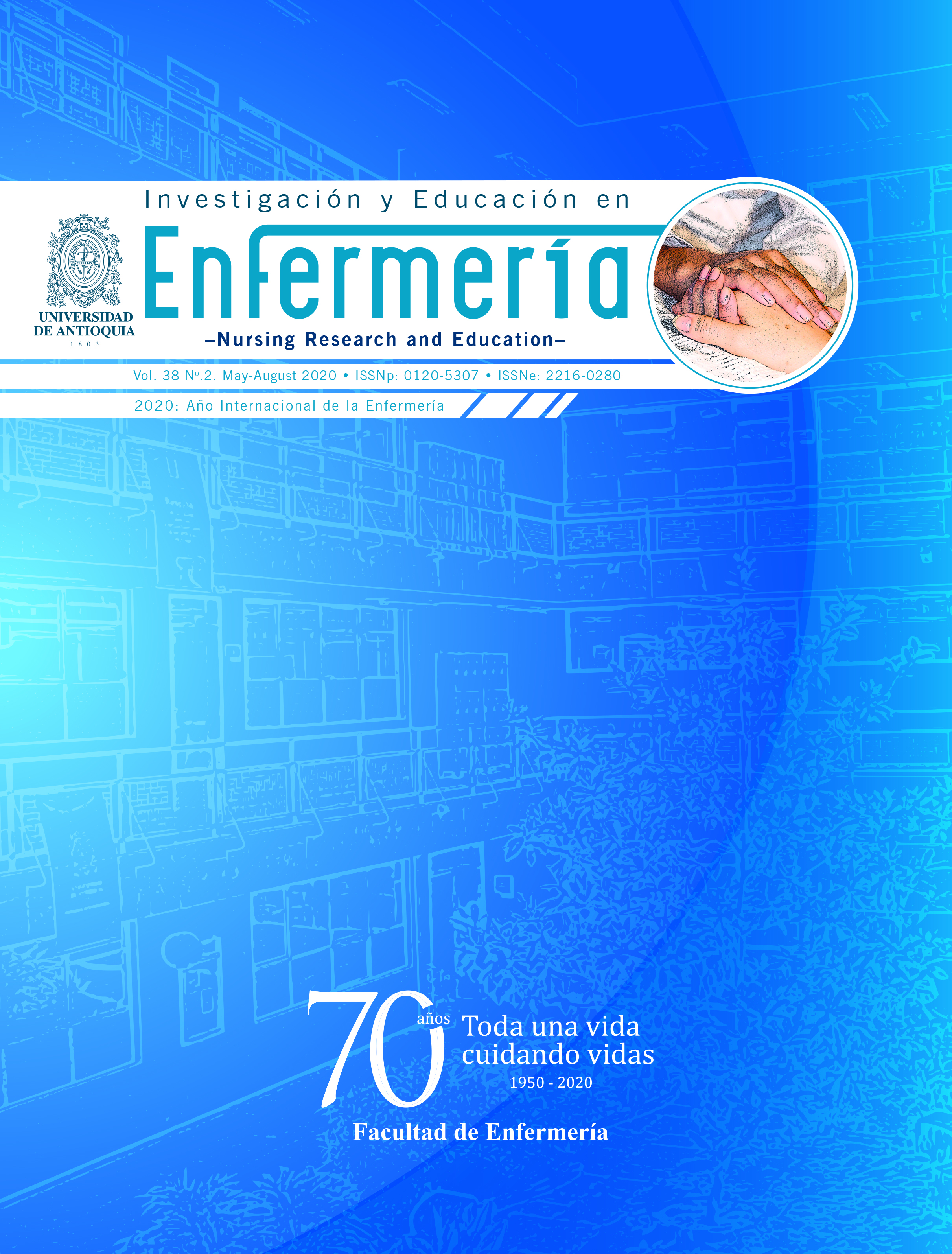Psychometric Properties of the Functional Social Support Domain of Perinatal Infant Care Social Support
DOI:
https://doi.org/10.17533/udea.iee.v38n2e04Keywords:
validation studies, psychometrics, reproducibility of the results, translating, mothers, social supportAbstract
Objective. To determine the face, content, construct validity, and reliability of the functional social support domain of Perinatal Infant Care Social Support (PICSS) translated into Spanish and adapted for first-time mothers of term babies.
Methods. Validation study of the functional social support domain of PICSS, which has 22 items with response options from 1 to 4; higher scores indicate greater social support. A translation, back-translation, and cultural adaptation process took place along with an expert review to evaluate face and content validity. In total, 210 mothers participated to establish construct validity and the reliability of the domain. The content validity index and factor analysis were used to identify the structure of the domain. Reliability was estimated using Cronbach’s alpha coefficient.
Results. Linguistic and cultural adaptations were performed, along with validation and reliability. Face validity for mothers was the following: high comprehension (94%); and for experts: high comprehension (95.83%), high clarity (96.53%), and high precision (92.82%). In relevance and pertinence, the content validity index was high (0.97). Construct validation identified two factors that explained 76% of the variance of the domain evaluated: factor 1 “Supporting presence -emotional and appraisal support” (13 items, 39%) and factor 2 “Practical support -informational and instrumental support-” (9 items, 37%). Cronbach’s alpha value was 0.97.
Conclusion. Given the robust psychometric properties of the Spanish version of the functional social support domain of PICSS, this may be used to identify the functional social support in the mothers.
Downloads
References
35(5):649-51.
2. Demarchi RF, Nascimento VFd, Borges AP, Terças ACP, Grein TAD, Baggio É. Perception of pregnant women and
primiparous puerperans on maternity. J. Nurs. UFPE On line. 2017; 11(7): 2663-73.
3. Carvalho JMN, Gaspar MFRF, Cardoso AMR. Challenges of motherhood in the voice of primiparous mothers: initial
difficulties. Invest. Educ. Enferm. 2017; 35(3): 285-294
4. Shorey S, Chan SW, Chong YS, He HG. Perceptions of primiparas on a postnatal psychoeducation programme: the
process evaluation. Midwifery. 2015; 31(1):155-63.
5. Aston M, Price S, Monaghan J, Sim M, Hunter A, Little V. Navigating and negotiating information and support:
Experiences of first-time mothers. J. Clin. Nurs. 2018; 27(3-4):640-9
6. Lucchini-Raies C, Márquez-Doren F, Garay Unjidos N, Contreras J, Jara D, Calabacero C, et al., Care during
Breastfeeding: Perceptions of Mothers and Health Professionals. Invest. Educ. Enferm. 2019; 37(2):e09.
7. Leahy-Warren P. Social support for first-time mothers: an Irish study. MCN Am. J. Matern. Child. Nurs. 2007;
32(6):368-74.
8. Zandi M, Vanaki Z, Shiva M, Mohammadi E. Process of becoming a mother for Iranian surrogacy-commissioning
mothers: A grounded theory study. Jpn. J. Nurs. Sci. 2018 ;15(1):3-16.
9. Maehara K, Mori E, Tsuchiya M, Iwata H, Sakajo A, Ozawa H, et al. Factors affecting maternal confidence among
older and younger Japanese primiparae at one month post-partum. Jpn. J. Nurs. Sci. 2016; 13(4):424-36.
10. Leahy-Warren P, McCarthy G, Corcoran P. First-time mothers: social support, maternal parental self-efficacy and
postnatal depression. J. Clin. Nurs. 2012; 21(3-4):388-97.
11. Leahy-Warren P, Mulcahy H, Lehane E. The development and psychometric testing of the Perinatal Infant Care
Social Support (PICSS) instrument. J. Psychosom. Res. 2019; 126:109813.
12. Muñiz J, Hernández A, Ponsoda V. Nuevas directrices sobre el uso de los tests: investigación, control de calidad y
seguridad. Papeles del Psicólogo. 2015; 36(3):161-73.
13. Fehring R. The Fehring model. Classification of nursing diagnoses: proceedings of the tenth conference of North
American Nursing Diagnosis Association Philadelphia: Lippincott; 1994. P.55-62.
14. Hernández Sampieri R, Fernández Collado C, Baptista Lucio MdP. Metodología de la investigación. (6th Ed).
McGraw-Hill; 2014.
15. Polit D, Beck T, Owen S. Focus on research methods is the CVI an acceptable indicator of content validity. Res.
Nurs. Health. 2007; 30: 459-67.
16. Polit DF, Beck CT. Nursing research : principles and methods. 7th Ed. Philadelphia: Lippincott Williams & Wilkins;
2004.
17. Gjestland T, Gelderblom FB, Fidell S. Sample size implications for calculations of community tolerance level values
from social surveys of noise-induced annoyance. J. Acoust. Soc. Am. 2019; 146(2):1212.
18. Raykov T, Marcoulides GA. An introduction to applied multivariate analysis. New York: Routledge; 2008.
19. Burns N, Grove SK, Gray J. Investigación en enfermería. Quinta edición: Elsevier España; 2012.
Downloads
Published
How to Cite
Issue
Section
License
Copyright (c) 2020 Investigación y Educación en Enfermería

This work is licensed under a Creative Commons Attribution-NonCommercial-ShareAlike 4.0 International License.
Derechos de propiedad / Direitos de Propriedade
English: If the article is accepted for publication, all copyright will be of exclusive property of Investigación y Educación en Enfermería. The text and the graphics included in the publication are exclusive responsibility of the authors and not necessarily reflect the thought of the Editorial Committee.
Español: Si el artículo es aprobado para publicación, todos los derechos son de propiedad de Investigación y Educación en Enfermería. El texto y las gráficas incluidas en la publicación son de exclusiva responsabilidad de los autores y no necesariamente refleja el pensamiento del Comité Editorial.
Português: Se o artigo for aceito para publicação, todos os direitos autorais serão de propriedade exclusiva de Investigación y Educación en Enfermería. O texto e os gráficos incluídos na publicação são de responsabilidade exclusiva dos autores e não refletem necessariamente o pensamento do Comitê Editorial.















